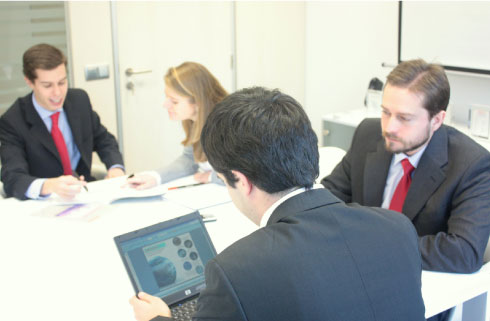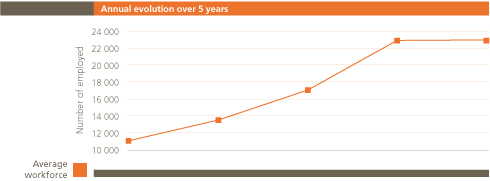 Abengoa
Abengoa
Annual Report 2009
- Corporate Social Responsibility Report
- Abengoa and Its People
- Human Resource Vision and Management
Human Resource Vision and Management
Abengoa is a multinational and multicultural company made up of more than 24,000 people who conduct their business through subsidiaries and affiliates, facilities and offices distributed throughout more than 70 countries around the world.
The management model implemented by Abengoa has made it a market leader and a point of reference for the activities it conducts and the industries in which it operates. The success of this model lies in having the right strategy and optimal management, and, above all else, in having an ideal human team to help achieve the strategic objectives pursued.
Abengoa believes that its people constitute its differentiating value as a company, and it is these people, through their preparation and commitment, who truly make a difference to the company’s results.
People represent genuine capital, an asset that generates value and wealth, and Abengoa’s human resource policies therefore underscore the importance of creating ideal conditions for people to develop and for their talent to flourish, enabling them to provide excellent levels of performance.

Adherence to the Global Compact and Respect for Universal Declarations
In 2002, Abengoa signed up to the United Nations’ Business Leadership Global Compact, a commitment which entails, on the one hand, support of and respect for the protection of human rights and, on the other, and in the field of employment rights, the need to eliminate all forms of discrimination in the workplace, all forms of forced or compulsory labor, the effective abolishment of child labor, respect for freedom of association and effective recognition of the right to collective bargaining.
In the company’s labor practices, Abengoa adheres to the United Nations’ Universal Declaration on Human Rights and its protocols, aligning the professional conduct of its employees to the same. It also abides by the international agreements approved by the UN and the International Labor Organization (ILO) on social rights, expressly the UN Convention on the Rights of the Child, the UN Convention on the Elimination of all Forms of Discrimination against Women, and those specifically related to forced child labor, occupational health and safety, freedom of association, discrimination, disciplinary practices, working hours and compensation. Likewise, Abengoa adheres to the ILO Tripartite Declaration of Principles Concerning Multinational Companies and the ILO Social Policy, and also the Organisation for Economic Cooperation and Development’s (OECD) Guidelines for Multinational Enterprises.
With this in mind, Abengoa neither accepts nor abides by any action that entails discrimination of candidates in any hiring process due to race, color, sex, religion, political or other views, nationality or social background, economic or birth status, and similarly upholds a policy of equal pay for equal work. For this reason, Abengoa upholds a policy of recruiting, hiring, training and promoting the most qualified individuals, regardless of race, religion, color, age, sex, marital status, sexual orientation, physical or mental disability, expressly and actively condemning all kinds of discrimination.
Abengoa also condemns all forms of child labor, in accordance with the terms of Convention 138 of the ILO on minimum age.
Abengoa’s Social Responsibility Policy on Labor Practices and Human Resource Policy
In accordance with the social responsibility commitments acquired through adherence to the United Nations’ Global Compact and the company’s own Code of Conduct, Abengoa has undertaken a policy on labor-related social responsibility, having integrated a social responsibility management system in compliance with the international SA 8000 model, thereby assuring ongoing improvements in the company’s social performance. The aims of this policy are as follows:
- Integrating labor-related social responsibility management into the company’s corporate strategy.
- Guaranteeing compliance with legal regulations in force and any other commitments undertaken in this area.
- Promoting the principles of the Global Compact in the company’s sphere of action: partners, suppliers and contractors.
- Promoting and fostering the personal and professional development of the people who make up the Abengoa organization through the creation of ideal working conditions and ongoing training.
- Recruiting, hiring, training and promoting the most qualified individuals, regardless of race, religion, color, age, gender, marital status, sexual orientation, country of origin or physical or mental disability.
- Ensuring appropriate preventive culture at Abengoa in accordance with its policy on Occupational Risk Prevention.
- Creating the conditions necessary for striking a balance between personal and professional life.
- Assessing and reviewing the company’s social performance, informing thereon in a transparent manner and establishing programs for continuous improvement.
Abengoa’s human resource policy is in concert with the company’s mission, vision, and values, as well as its operational strategy, and is therefore aligned with strategic objectives.
Fulfillment of these objectives, through the execution of the strategic plan, is the raison d’être of the company’s structure and human capital.

Photo taken by Mª Victoria Sánchez Jiménez from Abengoa
Principles of Human Resource management at Abengoa
Human resource management in the area of labor-related social responsibility is backed by SA 8000 standard (GIRH) certification, which guarantees that the policies and processes defined and implemented at Abengoa follow the standards of this norm. There were no reports of any incidents involving discrimination in 2009 via Abengoa’s information channels to this effect.
For Abengoa, human capital is what effectively enables the company to reach its objectives, while affording the company competitive edges that mark it apart through the team’s talent and excellent performance. For this reason, commitment, motivation, talent, initiative and the relentless search for excellence at work are currently key attributes for those wishing to join Abengoa.
The pursuit of the ideal is one of the basic underpinnings of human resource policy: the ideal in terms of each particular position and mission; the ideal in technical and generic matters.
Case Study
Attracting and Retaining Talent
Operating in more than 70 countries, Abengoa remains loyal to its policy of growth based on creating new technologies that contribute to sustainable development.
This growth has been made possible as a product of Abengoa’s ability to attract, develop and retain talent; a stable and highly-competitive team of professionals, and the company’s management model, characterized by corporate social responsibility, transparency and rigor in management, while championing the spirit of enterprise.
The talent and outstanding performance of the people who make up Abengoa’s staff constitute the driving force behind growth and the cornerstone of human resource management policy.
Abengoa’s workforce has grown over the last 10 years at a rate of 110%.

2009 Milestones
GIRH certification under the new version of the SA 8000 standard.
Consolidation of the human resource management model throughout the business units.
Implementation of Palmas Altas Campus social model.
Abengoa’s true competitive edge lies in its people, and in the preparation and commitment of each and every individual. This team of professionals makes a key difference to corporate results